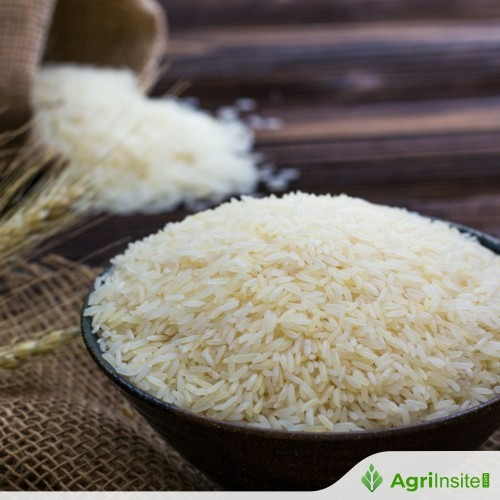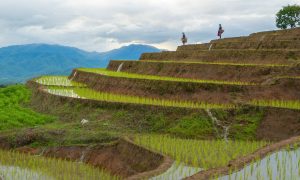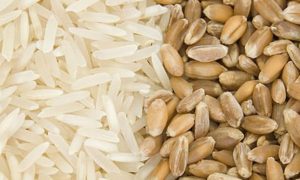Digong promised P7/kilo rice in SONA 2018, Bongbong P20/kilo rice in 2022 polls

The P20/kilo rice rollout sparks heated debate, with VP Sara Duterte calling President Marcos Jr. a “liar,” echoing past unfulfilled promises like Duterte’s P7/kilo rice. Despite criticism, the program aims to ease food insecurity. Meanwhile, rampant vote buying ahead of elections threatens democracy, with weak enforcement allowing this corrupt practice to persist unchecked.
There is heated discussion today on the administration’s upcoming P20 per kilo rice program. President Bongbong Marcos Jr. is consistently branded a “liar” by VP Sara Duterte on this issue.
But which administration, Bongbong or Digong, better handled our rice crises?
I recall President Digong’s third State of the Nation Address (SONA) in 2018, where he urged Congress to prioritize a proposed law that seeks to impose tariffs on rice in place of import quotas, saying this can bring down the price of the staple by as much as P7 per kilo, slowing inflation “significantly.” Duterte said he certified the rice tariff measure as urgent.
Around September also of that year, rice prices soared to P70 per kilo under his then Agriculture secretary Manny Piñol, with inflation rates as high as 6.7 percent. Three years later, the P7/kilo rice promise did not happen.
Digong’s administration focused on liberalizing rice imports to stabilize prices by increasing supply. However, this led to challenges for local farmers facing competition from cheaper imports. Under Digong’s leadership, rice smuggling flourished nationwide and local farmers’ palay were at the mercy of syndicated rice middlemen.
Bongbong’s administration, on the other hand, tries to strengthen agricultural infrastructure and provide subsidies to farmers, offering a more sustainable approach to addressing the rice crisis. While the immediate effects on rice prices are still unclear, these measures have the potential to enhance local production and reduce import dependency in the long run.
Anti-Agricultural economic sabotage laws were enacted to include smuggling, hoarding price manipulation. Warehouses of smuggled rice were raided and confiscated rice were distributed free to poor people nationwide.
Today, rice prices are down and the maximum suggested retail price for imported rice is P45 per kilo. This dropped P19/kilo from P64/kilo in January this year. This is due to the softening of international prices, lower tariffs and stronger pesos. NFA also sells P33/kilo rice in Kadiwa stores nationwide.
On the upcoming P20/kilo rice rollout, Agriculture Secretary Francisco P. Tri Laurel Jr. has ordered the distribution of NFA rice stocks to 12 provinces in Visayas ahead of the launch. The DA already secured clearance from the Comelec to roll out the program, a flagship campaign promise of President Marcos Jr. in 2022. On his Facebook page, President Bongbong Marcos Jr recently posted, “Twenty pesos per kilo of rice. That’s the promise – and now, we’re making it happen in the Visayas region”.
But VP Sara Duterte countered. “I don’t know what their motive is. Perhaps they are again trying to fool people with P20-per-kilo rice. “The person who promised P20 per kilo lied. He knew it wasn’t possible, but he still gave people false hope.” She also claimed that the rice being sold might be of such low quality that it would normally be used as pig feed. “Filipinos are not animals,” she said. VP Sara warned that such efforts were just part of a broader scheme to boost administration allies’ chances in the coming elections.
NFA administrator Larry Lacson snapped back and assured the public that the rice to be sold under the P20 per kilo rice program is of high quality. “I instructed our people that nothing of poor quality rice will leave the warehouse,” he said. He added that NFA’s rice stocks undergo regular monitoring and laboratory and other tests to assess their quality.
Public reactions to VP Sara Duterte’s statements are mixed. Some people support her with skepticism. Others, however, view her comments as overly critical. They argue that she must be unaware that his father promised a much lower P7/kilo of rice during his term. Was that promise given by her father during SONA 2018 a joke?
In reality, and if managed properly, the Duterte’s unfulfilled P7/kilo and Bongbong’s achieved P20/kilo rice programs are both steps in the right direction to address rice affordability for low-income families who are fighting food insecurity and low nutritional intake. With cheaper rice, they can allocate limited resources to other essential needs such as healthcare and education. Moreover, such initiatives can stimulate local economies by boosting demand for agricultural products and supporting local farmers.
While there is a risk of logistical issues in distribution, which might lead to shortages or unequal access across different regions, the program may strain government budgets. It may also require careful allocation of resources to sustain its long-term viability. But, on one hand, it could stimulate the economy by increasing rice demand and creating more jobs in the agricultural sector.
We must all remember that the P20-per-kilo rice program is basically a “crucial social service to those in need” . Food security as a fundamental right is priority rather than government profitability. This is similar to a bridge connecting two islands, enabling people to cross safely and efficiently. The program acts as a vital link, ensuring low-income families can access affordable rice, much like how a bridge provides access to opportunities and resources previously out of reach.
Rampant and unstoppable vote buying continues
With 13 days left until the election, the specter of rampant vote fraud looms larger than ever. To date, DILG has submitted 156 vote-buying complaints, vote selling, or abuse of state resources (ASR) to the Comelec’s Committee on Kontra Bigay. In turn, 74 candidates were given show cause orders by Chairman George Garcia to allow them to explain their side of the allegations. During the 2022 national elections, the Comelec received 1,000 complaints regarding vote-buying.
So far, there have been no candidates convicted of this hateful issue, according to Comelec chair Garcia. “It was difficult to establish guilt beyond a reasonable doubt because under the Omnibus Election Code, vote-sellers were equally liable as vote-buyers”. “So, when complainants know they can also be charged, they back down even if offered immunity from prosecution”.
Comelec’s provincial election supervisor Atty. Ma. Goretti Caseñas-Cañas in Leyte called vote-selling and vote-buying amodern cancer of democracy, an illness that does not heal and hinders the constitutional right to suffrage of every citizen. Cañas said no one was prosecuted for such offenses last year due to weak evidence and lack of witnesses.
In Metro Manila, votes are sold from P3,000 to P5,000, while in the provinces, especially in tight races, they are P7,000 to P15,000. Candidates offer non-appearance or staying at home during election day to weaken their opponents’ grip.
Vote buying is not merely a transactional exchange; it is a blatant assault on free and fair elections. Candidates, desperate to secure their positions, bribe voters with cash, goods, and employment promises. This corrupt practice that turnselections into auctions perpetuates a cycle of dependency and disenfranchisement, particularly among the most vulnerable sectors of society.
It is alarming that COMELEC admits that prosecuting vote buyers and recipients is fraught with difficulty. It signals a failure in enforcement and accountability. How can we expect a fair electoral process when the very institution tasked with safeguarding it is hamstrung by its limitations?
To Read more about Rice News continue reading Agriinsite.com
Source : Inquirer Net















